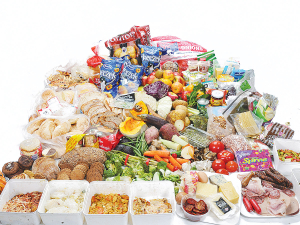NZ household food waste falls again
Kiwis are wasting less of their food than they were two years ago, and this has been enough to push New Zealand’s total household food waste bill lower, the 2025 Rabobank KiwiHarvest Food Waste survey has found.
 Forty nine per cent of all New Zealand households have taken action to reduce their food waste over the past 12 months.
Forty nine per cent of all New Zealand households have taken action to reduce their food waste over the past 12 months.
New research reveals that New Zealand households have made progress in reducing food waste over the past year, cutting the annual amount wasted by an estimated $300 million in the past year alone.
Forty nine per cent of all New Zealand households have taken action to reduce their food waste over the past 12 months.
HelloFresh’s study of 1,500 New Zealanders was undertaken to gain an understanding of Kiwi food waste habits and how the results stack up year-on-year.
The findings come as rugby star Portia Woodman-Wickliffe teams up with HelloFresh and food rescue charity KiwiHarvest for a ‘team talk’ on Kiwis food waste habits.
Since partnering with HelloFresh in 2023, Woodman-Wickliffe has been actively championing the reduction of household and food waste and says she applauds the efforts of Kiwi households.
“It’s encouraging to see so many Kiwis doing the mahi at home to reduce food waste,” she says. “By taking simple steps like meal planning, cooking the right portions and storing food properly we can make a huge difference.”
Of the 1,500 Kiwis surveyed, 60% said they spend between $200 - $499 per week on food, up from 45% in 2023.
Those who spend less tend to be more mindful about waste, with 24% of households spending under $100 per week, reporting a significant reduction in the past 12 months.
On average, an estimated 9% of a household’s weekly food shop goes to waste, equating to $1,326 worth of food waste per household per year.
New Zealanders aged 18-29 have the highest rate of food waste, with 12.3% of their weekly food shop going to waste, compared to the national average of 9%.
Angela Calver, chief executive of KiwiHarvest, says food waste is an “undeniable” environmental issue.
“We’re proud to have just reached the milestone of celebrating 13 million kilograms of food rescued and redistributed to vulnerable communities since we started up in 2012 – but there is so much more work to be done,” Calver says.
She says that KiwiHarvest, alongside other food rescue organisations, is experiencing significant funding cuts and growing demand, “so it’s equally as important for Kiwis to help relieve the pressure on the environment by doing their bit at home”.
Claudia Baptista-Fernandes, managing director of HelloFresh New Zealand, commends the collective effort of both Kiwis and organisations like KiwiHarvest, highlighting how meal kits can play a role in reducing food waste.
“At HelloFresh, we are committed to reducing food waste globally by focusing our efforts on everything from the supply chain right to the home kitchen,” she says.
One team with 43 head, including a contingent from Mid Canterbury, are reflecting on a stellar NZ DairyEvent.
Fonterra farmer shareholders have approved the mechanism for a $2/share capital return expected from the sale of its global consumer and associated businesses.
Trainees in the horticulture industry studying towards a certificate or diploma can now apply for Horticulture New Zealand's (HortNZ) 2026 Industry Training Scholarships programme.
OPINION: The first three Global Dairy Trade (GDT) auctions have been a morale booster for farmers.
Former Fonterra executive Alex Turnbull has been appointed CEO to lead all five Yili Oceania Business Division companies in New Zealand.
Fonterra executive René Dedoncker is leaving the co-operative later this year to lead Australian agribusiness Elders.